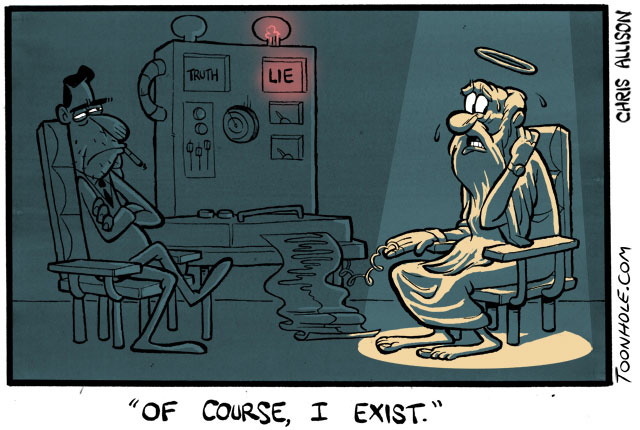- Hiena blogja
- A hozzászóláshoz be kell jelentkezni
- 1130 megtekintés
Hozzászólások
LOL :-) van egy ige, miszerint az Ur kineveti a vele perbe szallokat:
"He who sits* in the heavens laughs, The Lord scoffs at them." (Ps 2,4)
*: or "is enthroned"
- A hozzászóláshoz be kell jelentkezni
Miert pont angolul? Szerintem van neki magyar forditasa is (igazabol ezt a konyvet forditottak le a legtobb nyelvre). Ha mar itt tartunk, az ogorog es a latin forditas utan az angol is mar a forditas forditasanak forditasa (ennek megfeleloen biztos rengeteg koze lehet az eredetihez).
Csak a valtozatossag kedveert:
ghaH 'Iv sits Daq the chal DichDaq laugh. The joH DichDaq ghaj chaH Daq derision.
--
In truly successful relationships...
no one wears the pants.
- A hozzászóláshoz be kell jelentkezni
Miert pont angolul?
a cartoon is angolul van... :-)
Ha mar itt tartunk, az ogorog es a latin forditas utan az angol is mar a forditas forditasanak forditasa
nem egeszen. Az eredeti iratok heber, reszben aram es un. koine gorog nyelven lettek irva. A latin mar egy forditas, az angol detto, es a magyar szintugy. A forditas amugy valoban kozponti kerdes, de nyilvan egy komoly bibliatanulmanyozashoz az ember tobb forditast is megnez. En pl. 3 magyar, meg vagy 2 angol forditast szoktam osszevetni, ha nagyon ra akarok menni az arnyalatokra. Az egyik kedvencem, az Amplified Bible, ha olyan az adott resz, akkor az adott szo osszes lehetseges angol valtozatat kozli. Szoval nem annyira veszes a dolog. Olyan forditasnak mondjuk valoban nem sok letjogosultsaga van, amelyik az eredeti nyelvekrol kb. 5 kozvetito nyelv segitsegevel jut el az olvasohoz. De a jelenlegi forditasok aligha igy allnak elo.
Az allitasod kb. tehat az, mintha Shakespeare-t hiabavalo lenne leforditani magyarra, csak mert mar semmi koze az eredetihez (sic!)...
- A hozzászóláshoz be kell jelentkezni
Az eredeti aramirol forditottak ogorogre, onnan latinra. Ezt egysegesitettek, ez a vulgata. Utana az osszes tobbi nyelvre errol a latin verziorol forditottak, szoval ami forditasi hiba korabban belekerult, az ott is maradt (az osszesben).
Ezek kozul a kedvencem Mate 19:24:
Sőt azt is mondom nektek: "Könnyebb a tevének a tű fokán átmenni, mint a gazdagnak az Isten országába bejutni."
Elvileg az egyik koztes nyelven a teve es a kotel nagyon hasonlo szo volt. Ugy mar kicsit tobb ertelme lenne. (ja, es a Koranban is szerepel valami hasonlo)
A masik kedvencem meg Elena Filatova blogjaban volt (Jelenesek 8:10-11):
Being non religious, I am not a very concerned about my sins, because price for the sins we'll pay in the world thereafter, but I am really concerned about mistakes, where price we got to pay already in this world... I am not optimist who sees the glass half full and not a pessimist who sees the same glass half empty. I am a realist who always sees the glass exactly as it is and here in Chernie I see through a glass, darkly, that authors of the Bible had somehow foreseen the Chernobyl disaster.
In Greek, that the New Testament was originally written in, the verse where it say- "..and there fell a great star from heaven, burning as it were a lamp.." the word "fell" means "to hover or to settle," and the word "star" translates to "as scattered across the sky." It in turn is derived from another Greek word which meant "to spread like a carpet" - an appropriate description of the radiation cloud that spread across the area. Most interesting that the word for "lamp" comes from a Greek verb meaning "to radiate." When you make that into a noun, you have "radiation."
In verse 11 the name of the star is even capitalized, as a proper name of a place.. As for the third part of the world, it was popular in the first centuries Greek to use the term "one-third" to describe a large quantity. Chernobyl may be as well a group name for all Chernobyls to come, wherever a "great star" will fall again, the future of this land will be the same, radiation and wormwood- the grass of oblivion.
http://www.angelfire.com/extreme4/kiddofspeed/chapter30.html
--
In truly successful relationships...
no one wears the pants.
- A hozzászóláshoz be kell jelentkezni
Az eredeti aramirol forditottak ogorogre, onnan latinra. Ezt egysegesitettek, ez a vulgata. Utana az osszes tobbi nyelvre errol a latin verziorol forditottak
fals. Egyreszt az oszovetsegi reszben nem csak aram van, hanem azert boven heber is, de az ogorog az az ujszovetsegi resz nyelve. Letezik egy LXX nevu dolog is (=Septuaginta), ami az Oszovetseg gorogul, de a latinnak semmi koze ehhez (sem az egeszhez), es nem veszett el a heber/aram verzio sem, hogy le kelljen mondanunk rola. A vulgata valoban letezik, de hogy minden mas forditas ebbol indult volna ki, az keptelenseg, mert a bibliaforditok az eredeti (nyelvu) keziratok masolatait gyujtik be. Mondjuk furcsa is lenne, ha a teologusok heberul es gorogul tanulnanak, ha mindennek az alapja a vulgata lenne - marpedig tanulnak. A mar hivakozott Amplified Bible-ben jellemzo labjegyzet az, hogy "az eredeti gorog szo....". Ennek sem lenne tul sok ertelme, ha angolra is latinbol ultettek volna at.
Egy nem hivo ember bibliaertelmezese mar onmagaban mokas, de ha pont a Jelenesek konyverol mondja meg a tutit, az meg foleg, arrol nem is beszelve, hogy az ember altalaban szereti a sajat nyomorat belelatni az esemenyekbe...
- A hozzászóláshoz be kell jelentkezni
Ez jó. Az hazugság, ha azt állítja, hogy létezik, tehát állítani sem tudná, mivel nem létezik. :P
>>: sys-admin.hu :<<
- A hozzászóláshoz be kell jelentkezni
"No, no. Ryan is completely correct. Something that does not exist cannot lie."
:-D
- A hozzászóláshoz be kell jelentkezni
Ja hogy az Isten akarna lenni?! :)
- A hozzászóláshoz be kell jelentkezni
